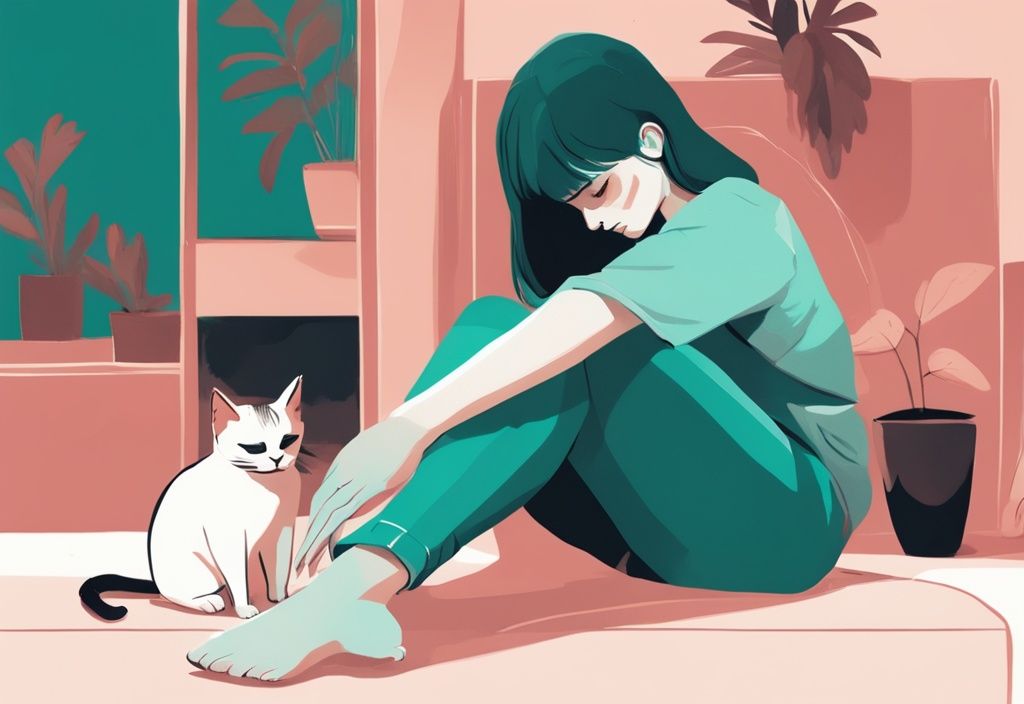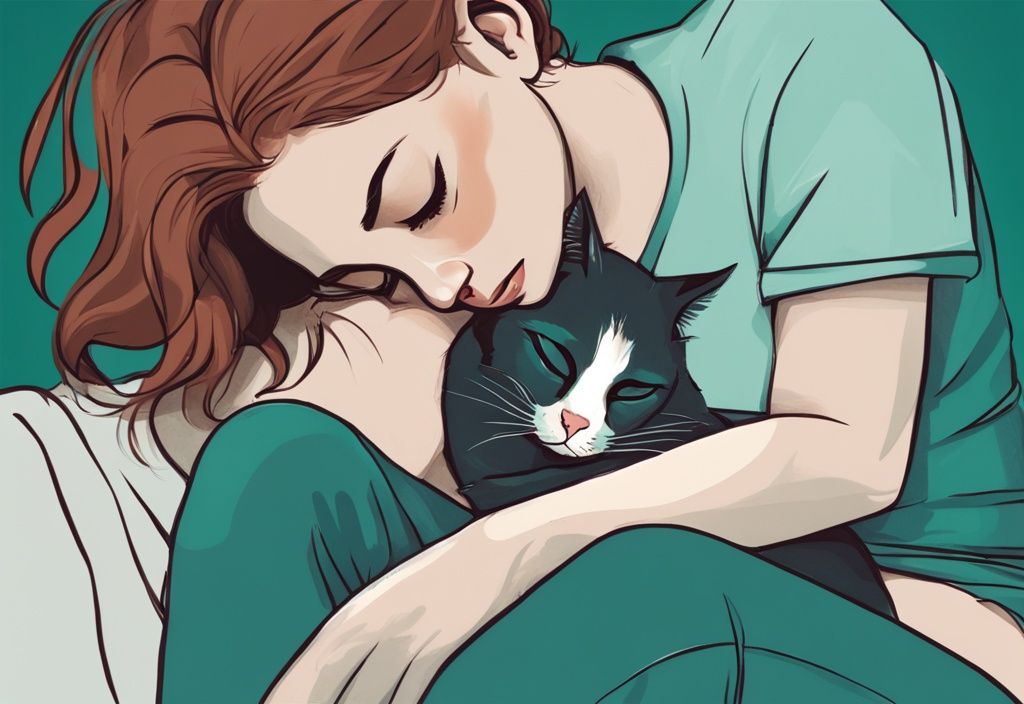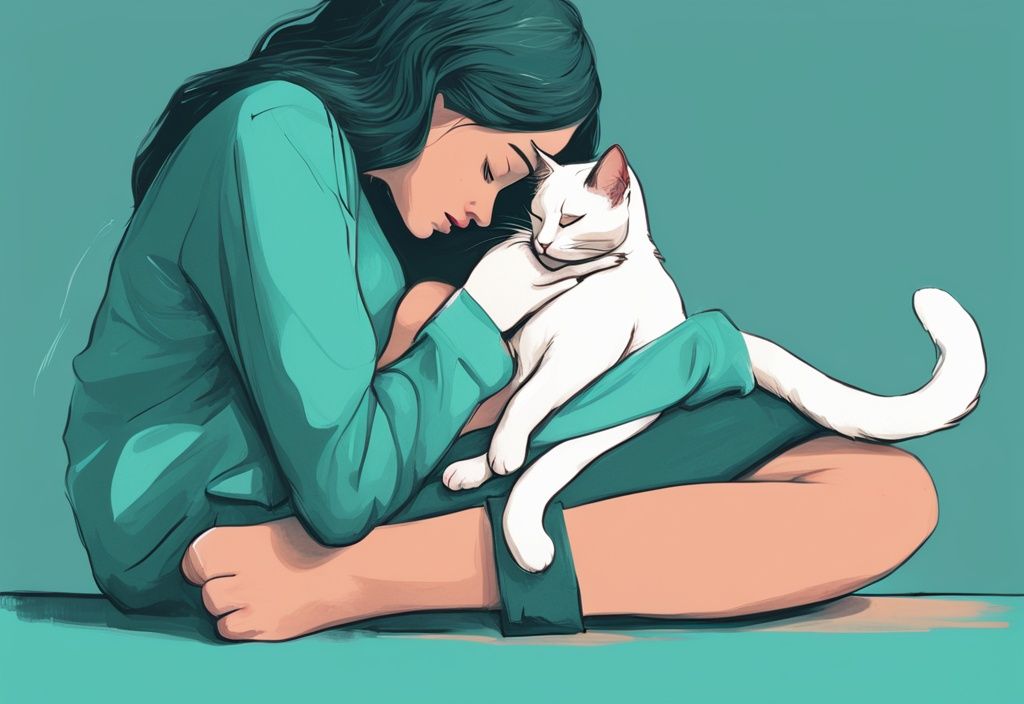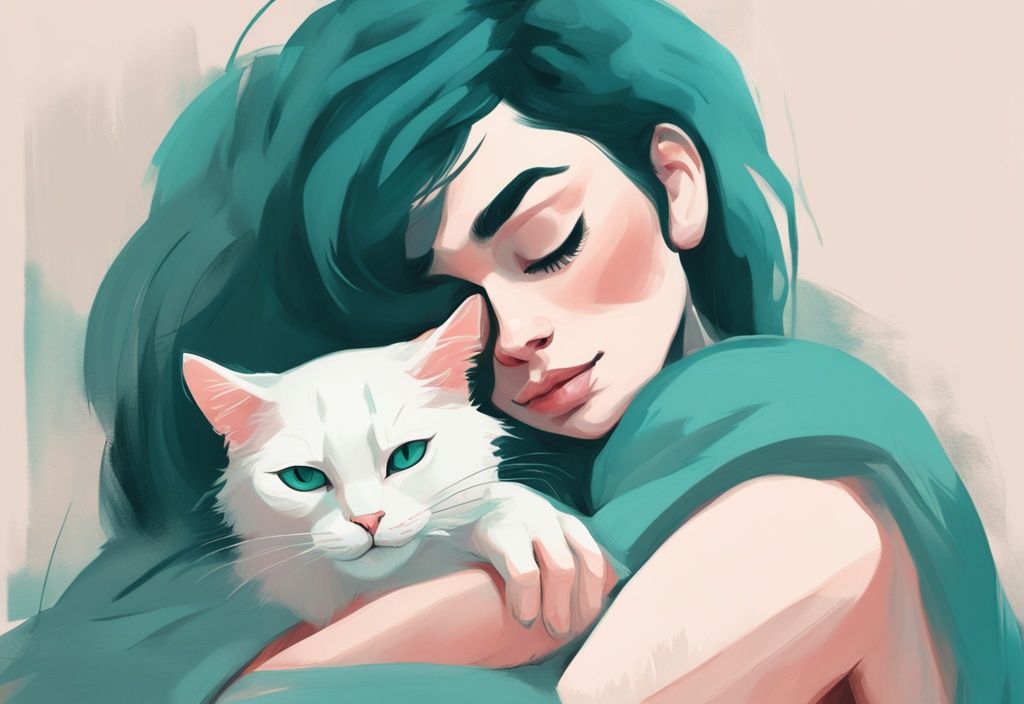Ever thought, “Why is my dab-of-attitude furry friend acting like a love-sick kitten?” It’s like your cat has gone on an affection spree overnight! Well, you’ve got it right. It’s amusingly baffling – like Whiskers, my frisky feline, once turning into a cuddle puddle – quite a head-scratcher! But there’s always method to the madness – age, health, emotional fluxes, or just a shift in the environment.
So, buckle up as we delve deeper into this adorable conundrum to discern the underlying causes. We’ll navigate through this charming little maze of newfound affection, ensuring a stronger bond with your independent-turned-dependant furball. Trust me, by the end of this article, the secret behind your cat’s extra neediness will be your laughter-filled, fun little ‘aha!’ moment!
As we stride forth on this journey, my promise is not just to entertain, but also to equip you with invaluable insights to enhance your furry friend’s wellbeing. Here’s to many more purr-fectly harmonious days ahead!
Introduction
An Unexpected Increase in Feline Affection: What Does It Mean?
When your typically independent cat starts seeking out more attention, it might leave you scratching your head, wondering, why is my cat being so affectionate? This sudden uptick in your feline friend’s lovey-dovey behavior could be due to several reasons, from aging to health issues. It’s not just about quenching your curiosity; understanding these behavioral changes can strengthen your bond and help address any underlying concerns.
Wondering why your usually aloof feline suddenly turns into a clingy lap-warmer? Increased affection can appear in various forms—frequent cuddles, more purring, and a desire to stick close to you. By tuning in to these behaviors, you’ll gain insights into your cat’s emotional and physical state.
Cats use affectionate behavior as a mode of communication, signaling changes in their needs or surroundings. As they get older, they often seek more comfort and assurance from their human pals. Think of it as your cat’s way of saying, “I need a little extra TLC.” Sensory impairments or cognitive changes that come with aging can also make them more reliant on you.
Sometimes, extra snuggles mean your cat isn’t feeling their best. Yep, that sudden surge in affection might be a cry for help. If your once-distant kitty is now glued to you, it could indicate they’re unwell. Along with increased affection, you might notice changes in their eating habits or grooming routines. Make sure to consult a veterinarian if this clinginess persists or is coupled with other worrying symptoms.
Cats are incredibly intuitive, picking up on the vibes from their human companions. Going through stress, anxiety, or major life changes like pregnancy? Your furry friend might become more affectionate, offering comfort and seeking reassurance. This extra love not only helps with any kitty distress but also strengthens your special bond.
Figuring out why is my cat being so affectionate involves considering multiple factors—from shifts in their environment and daily routines to health-related issues.
Being attentive and responsive to these signs will not only deepen your relationship but also ensure your kitty’s happiness and well-being.
Changes in Your Cat’s Affectionate Behavior
Change in behavior can be a bit puzzling, especially when your usually aloof feline suddenly turns into a cuddle bug. Here’s a closer look at why your cat might be extra affectionate lately.
Age-Related Differences in Cat Affection
As cats age, their behavior often transforms, and understanding their special needs as they grow older is crucial. Just as people are living longer than they did in the past, cats are living longer too, and there is every reason to expect that the ‘graying’ cat population will continue to grow. For more insights on caring for senior cats, check out this resource on [special needs of senior cats](https://www.vet.cornell.edu/departments-centers-and-institutes/cornell-feline-health-center/health-information/feline-health-topics/special-needs-senior-cat). They seek more comfort and attention from their owners, turning into real snugglers. If you’ve been wondering why your cat is being so affectionate, their age could be a significant factor. Older cats tend to slow down and may prefer to curl up close to their favorite humans. This close contact helps them feel secure and comfortable in their environment. Familiar routines and faces become crucial, offering them a comforting sense of predictability. Plus, the physical changes that come with aging mean they need more reassurance and comfort, often found in your gentle strokes and presence.
How Sensory Abilities and Dementia Affect Your Cat’s Behavior
Declining senses like vision and hearing are quite common as cats get older. These sensory impairments can make your kitty more reliant on you for guidance and companionship, leading to more affection. If you find yourself asking, “Why is my cat being so affectionate?” particularly if they are getting on in years, consider their sensory capabilities.
Additionally, cognitive dysfunction or dementia could be another reason your cat is suddenly clingy. Cats experiencing cognitive issues may be seeking reassurance and comfort in their increasingly confusing world. Recognizing these changes and providing a stable, comforting environment can help manage and understand your cat’s increased need for affection. If you’re also interested in understanding pet behavior, you might wonder, why does my dog chew his bone on me, as it can be a sign of seeking comfort or attention.
Isn’t it fascinating how much our furry friends communicate with us through their behavior? Understanding these nuances can help strengthen the bond you share.

Decoding Cat Behaviour and Sensing Human Changes
Cats are mysterious little companions, but sometimes their actions speak louder than words. When Whiskers starts being extra cuddly, it could be his instinctive intuition kicking in, decoding the changes in your environment and your body. Let’s dive into the fascinating world of cats and uncover the reasons behind this surge of affection.
The Natural Intuition of Cats: Detecting Pregnancy and Illness in Humans
Ever wondered why Whiskers decides to be your shadow all of a sudden? It might be because your body is giving off signals that only his sharp senses can detect. Cats have an amazing ability to sniff out changes in body chemistry, like when a human is pregnant. This isn’t just random affection—it’s Whiskers responding to your changing scent and hormone levels, acting as your furry guardian. Similarly, cats can pick up on when something’s off health-wise. For those with canine companions, you might wonder if certain treatments are safe. For example, is Cytopoint for dogs safe? Maybe you’ve caught a cold or are feeling a bit under the weather. Whiskers perceives these subtle shifts in your behavior or scent and turns into a comforting ball of fluff. His increased affection is his way of saying, “I’m here for you!”
Emotional Changes and How Your Cat Reacts
Let’s not forget that cats have a sixth sense when it comes to human emotions. Whiskers is a keen observer and can definitely tell if you’re stressed out from a tough day at work or feeling blue. His response? More purring, cuddles, and those adoring looks. Whiskers picks up on your emotional vibes and wants to make you feel better. It’s his way of reassuring you that everything will be okay.
This tender reaction from Whiskers highlights how deeply intuitive our feline friends can be. In times of emotional turbulence, he’s your little emotional support buddy. The next time you feel Whiskers curling up a bit tighter next to you, know that he’s picking up on your mood and offering his silent, loving comfort. Isn’t it amazing how these tiny creatures can be such big sources of support?
Health Factors and Affection Increase
Understanding why your cat suddenly becomes more affectionate can open the door to recognizing underlying health issues. Let’s delve into how health can shape your feline friend’s behavior and what signs to look out for.
Could More Affection Indicate Illness in Your Cat?
One less common reason why your cat is being so affectionate is that it might not be feeling well. Cats are masters at hiding their discomfort, but changes in their usual behavior can be a clue. If your feline friend suddenly becomes clingier than usual, it could be its way of seeking comfort due to an underlying health issue. Pay attention to these behavioral changes as they can often signal that something is amiss with your pet’s health.
Sick cats may exhibit different changes, including increased affectionate behavior. When cats are unwell, their need for human comfort often heightens. This is a crucial adaptation mechanism, as the increased closeness offers them a sense of security and support. Therefore, addressing why your cat is being so affectionate involves recognizing this potential health factor and taking prompt action if necessary.
Recognizing the Common Signs of Sickness in Cats
It’s essential to differentiate between mere affection-seeking and a cry for help. Common signs of sickness in cats include noticeable changes in appetite, whether increased or decreased, alterations in grooming habits, and unusual elimination patterns.
A cat that once was meticulous about grooming itself may neglect this task if it feels unwell, while changes in litter box use can also be a significant indicator.
Since cats are creatures of habit, a sudden shift in these patterns combined with increased affection should raise a red flag. If you observe such changes, it’s vital to consult with a veterinarian to rule out any medical issues. Understanding why your cat is being so affectionate can, thus, lead to prompt and adequate care, ensuring that your feline companion remains healthy and content.
Comfort, Attention, and Cats
Ever noticed that your cat is suddenly glued to your side and wondered why? Let’s dive into the world of feline affection! Here, we’ll uncover why your cat might be acting extra cuddly and affectionate.
Is Your Cat Seeking More Attention?
Your cat might be displaying increased affection if it feels neglected or is not getting sufficient interaction. This behavior is a signal that your feline companion craves more engagement and bonding with you. A cat’s need for attention can manifest in various forms, including purring, rubbing against you, or even following you around the house. It is essential to recognize these signs and respond by setting aside quality time for petting, playing, and communicating with your cat.
How Environment Changes Affect Your Cat’s Affection
Various environmental changes can significantly impact your cat’s behavior, often resulting in heightened affection. Moving to a new home, introducing new pets, or welcoming additional family members can be sources of stress for your cat. This stress might cause your cat to become more affectionate as a coping mechanism to seek comfort and reassurance from familiar faces. By creating a stable and predictable environment, you can help alleviate your cat’s anxiety. Providing a safe and calm space, along with gradual introductions to new elements, can make transitions smoother and help maintain your cat’s emotional well-being.

Routine, Familiarity, and Cat Behavior
Cats are quirky little creatures that thrive on routine and the comfort of familiar surroundings. Exploring how these aspects impact their behavior can reveal why changes might make your feline friend extra snuggly.
Does Your Cat’s Routine Affect Its Affectionate Behavior?
Cats are well-known for their love of routine and structure. They thrive on predictable schedules, whether it’s feeding times, play sessions, or bedtime rituals. These routines provide them with a sense of security and predictability. When this established routine is disrupted, it can lead to feelings of insecurity and anxiety. As a result, cats may seek additional comfort and reassurance from their owners, showing increased affection. This need for stability and predictability is a common reason why you might wonder, “why is my cat being so affectionate?” during times of change.
The Role of Familiar People and Environment in Your Cat’s Affection
Cats often form deep bonds with their owners and the environments they inhabit. Familiarity with people and places is crucial for their emotional well-being. A stable, familiar environment means less stress and more consistent behavior, including affection.
Your cat’s increased affection can be a sign of their contentment with their surroundings and the relationships they have formed. On the contrary, any changes in the household, such as a new pet, a move, or even a new family member, can disturb this balance. This can drive your cat to seek more affection, as they look for reassurance in their familiar human companions.
If you ever ask yourself, “why is my cat being so affectionate?” consider what changes or disruptions might have impacted their sense of familiarity and comfort. Maybe your cat is just trying to tell you, “Hey, I need a little extra love right now!”
Feeding Relations and Affection
Ever felt a sudden surge of affection from your feline friend? Your curious mind might be asking, “why is my cat being so affectionate”. Let’s dive into how feeding times could be the secret behind this cuddly behavior.
Is Your Cat Showing Affection Because It’s Hungry?
Have you ever wondered, “why is my cat being so affectionate”, particularly around mealtimes? Cats are adept at expressing their needs, and hunger is a primary driver for many behaviors. Often, an increase in affectionate actions, such as rubbing against your legs or purring loudly, signals their request for food.
This behavior is a clever strategy to prompt feeding from their owners, ensuring they are noticed and their needs are met. Whiskers, my cuddly rescue cat, can be incredibly persuasive with his adorable antics when it’s nearing his dinner time. It’s like they have an internal clock that revolves around their stomachs!
How to Discern Hunger-Driven Behavior in Cats
To determine if your cat’s extra affection is hunger-driven, observe their behavior patterns. A noticeable increase in affection occurring specifically around feeding times is a strong indicator that their love might be more about their empty stomach than their fondness for you.
Recognizing these patterns helps differentiate between genuine affection and food-seeking behavior, allowing you to better meet your feline friend’s needs while understanding their communication style. When asking yourself “why is my cat being so affectionate”, consider their feeding schedule and look for consistency in their actions related to hunger. Cats, much like humans, can be surprisingly predictable!
By tuning into these signals, you can maintain a harmonious and mutually joyful relationship with your cat. It’s all about understanding those silent yet expressive cues your furry companion uses to communicate. Ah, the joys of being a pet lover!
Emotional Connection in Newly Adopted Cats
Understanding Why New Cats Show More Affection
Newly adopted cats are often like little snuggle magnets, seeking to bond with their new humans. Imagine how unfamiliar everything is around them—new smells, new sounds, and new faces. This unfamiliarity can make them feel a bit anxious or unsure. So, what’s a kitty to do? They might become extra affectionate to create a sense of security and connection. It’s like their way of saying, “Hey, can we be best friends?” This natural coping mechanism helps them find comfort in their new digs and trust in their new humans. Ever wondered, “why is my cat being so affectionate?” That’s your answer right there!
Strengthening Bonds with Your Newly Adopted Cat
Building that oh-so-special bond with your newly adopted cat doesn’t have to be complicated—think of it as a journey filled with cuddles and playtime. Spend quality time together by engaging in activities like play sessions, gentle petting, and even talking to them. Cats love that! A predictable routine for feeding, playtime, and naptime will also help your cat feel secure in their new home.
It’s like setting the stage for trust and comfort. Consistency is key here! Create a stable environment, shower them with your attentive care, and watch your relationship blossom. Just remember, be patient and loving, and you’ll turn any kitty uncertainty into a lasting, affectionate bond. After all, isn’t that what we’re all aiming for—a happy, purring companion for life?
Excessive Affection: Causes and Solutions
Seeing your cat suddenly turn into a little cuddle machine? Well, there might be more to this extra affection than meets the eye. Let’s dive into the reasons behind this behavior and find some purrfect solutions.

Encouraging Independence in Your Cat
Understanding why your cat is being so affectionate can often point to a need for increased independence. It’s true that affection from your pet can be incredibly rewarding, but it’s just as important to encourage them to develop their own sense of independence.
Positive reinforcement can go a long way. When Whiskers plays alone or explores new corners of the house, reward that bravery with treats or a gentle pat. This fosters confidence and ensures he doesn’t rely solely on you for comfort.
Interactive toys are another excellent way to keep your cat engaged and mentally stimulated. Toys that mimic prey, like feather wands or laser pointers, can keep your cat entertained and provide a physical outlet for their instinctual behaviors. Rotating these toys frequently can also prevent your cat from getting bored, further promoting independent play.
Building a Space that Respects Your Cat’s Independence
Creating a cat-friendly environment that allows for both exploration and personal space is key to addressing why your cat is being so affectionate. Cats need an area where they feel safe and can retreat to if they’re feeling overwhelmed or just in need of some alone time.
Consider setting up a cozy corner or perch where they can observe their surroundings without being disturbed. This could include a comfortable bed, soft blankets, or even a dedicated cat tree.
Respecting your cat’s need for solitude is crucial. Avoid over-coddling and give them the autonomy to decide when they want interaction. This means not picking them up unnecessarily and allowing them to approach you on their own terms. By doing so, you promote a balanced relationship where your cat feels secure but not smothered, ultimately reducing excessive affection driven by anxiety or insecurity.
Conclusion
Celebrating Your Cat’s Affection: A Balance of Independence and Closeness
Ever wondered, “why is my cat being so affectionate?” Understanding this behavior is the first step to fostering a loving relationship with your furry friend. It might be due to age-related changes, sensory impairments, or even subtle health indicators. Sometimes, it’s simply a reaction to their surroundings or your emotional state. Recognizing these nuances can really help you connect better with your feline companion.
Balance is the magic word when it comes to your cat’s well-being and happiness. Sure, those purring cuddle sessions are wonderful, but don’t forget that cats also crave a bit of independence. Spend quality time together, but respect their need for alone time too. A home filled with interactive toys and cozy retreat spots makes a world of difference. Your cat will thank you with more purrs and snuggles!
Seeing your cat’s increased affection as something to celebrate can enrich your bond even further. It’s all about understanding their needs—letting them feel loved and secure, while also giving them the freedom to explore their world. Whether it’s a warm lap to curl up in or a secluded nook to hide, meeting these needs ensures your cat feels truly at home.
By embracing this approach, not only do you enjoy a more fulfilling relationship, but your cat does too. It’s a two-way street—your love and care meeting their need for both affection and independence. So next time your cat is extra cuddly, remember it’s just another way they’re saying, “I love you, human.”
FAQ
Why has my cat suddenly become more affectionate?
Has your feline friend turned into a cuddle machine overnight? Sudden changes in affectionate behavior can often be due to shifts in their routine, environment, or health. Cats are incredibly sensitive and can sense even the smallest changes around them. Whether it’s a change in your mood or a new piece of furniture, these can make a huge difference. Let’s not forget that older cats, like my Whiskers, often seek more comfort and familiarity as they age, and that means more snuggle time!
How can I tell if my cat’s affection is a sign of illness?
Increased affection shouldn’t always be brushed off as mere sweetness. When Whiskers kept purring and following me around incessantly, I knew something was up. If this new affectionate behavior comes with changes in appetite, grooming habits, or litter box use, it’s time to consult with your vet. Catching potential health issues early can mean a world of difference for your furry loved one.
Is my cat becoming more affectionate with age?
Absolutely! As cats grow older, like my darling Whiskers, you’ll likely notice a surge in their snuggly behavior. Reduced activity levels and sensory impairments push them to seek security and comfort in familiar people and routines. It’s as if they’re saying, “I need you more now, human,” and honestly, it’s too heartwarming to resist.
How do hormonal shifts influence my cat’s behavior?
Hormonal changes can turn your cool cat into a clingy companion in no time, especially if she’s a non-neutered female. Ever notice a sudden spike in affection when she’s in heat or pregnant? That’s those hormonal surges at work. It’s like they’re driven by an instinctual need to be closer to you during these times.
Why is my newly adopted cat unusually affectionate?
When you bring a new cat home, don’t be surprised if they shower you with love and attention. This is a common behavior as they look for comfort and stability in their new environment. I remember when I first adopted Whiskers; she wouldn’t leave my side, seeking reassurance and affection as she adjusted to her new surroundings.
